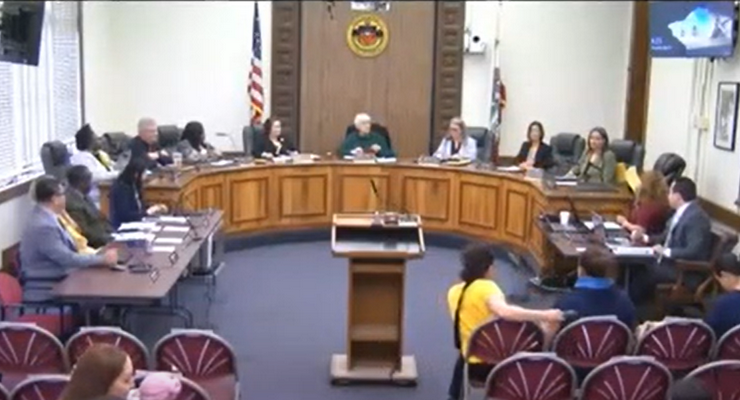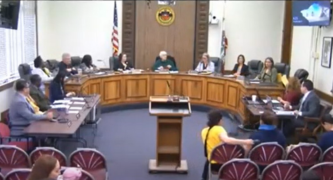
The Pasadena Unified School District Board of Education unanimously approved resolutions aimed to fund the District’s plan to improve its facilities and enhance its programs in the coming years.
Approved at the May 23 Board meeting were the proposed $900 million bond measure, which would cost property owners $60 per $100,000 of assessed property value, and the $90 annual parcel tax, expected to generate $5 million annually for eight years.
These measures are set to be voted upon by Pasadena residents in the November elections.
The bond measure specifically aims to fund upgrades to aging school facilities listed in the District’s master plan, which was approved by the Board in 2023. The parcel tax revenues will be used by the District to enhance its academic, visual, and performing arts programs and attract and retain qualified teachers and staff.
While the bond measure language includes charter schools, the parcel tax measure is silent on how charter schools will benefit from the funding measure. Charter schools are public schools operated independently of public school systems, either by nonprofit or for-profit organizations.
Members of the public, including parents whose kids are studying in charter schools and charter school administrators, packed the meeting room to urge the Board to include charter schools in both funding measures.
“I’m here to advocate for the inclusion of charter schools in the upcoming bond and parcel tax measure language,” Shawn Brown, founder and Executive Director of Pasadena Rosebud Academy Charter School said. “By investing in charter schools education now, you ensure a smoother transition and continuity in their learning journey when they enter Pasadena Unified School District schools.”
Kasey Kokenda from the California Charter School Association, which claims to represent 165,000 families in charter schools across Los Angeles County and nearly 2,000 Pasadena charter school students, said charter schools are also public schools like Pasadena Unified School District sites, and their students also deserve support.
“They are all equally deserving of equitable educational funding and support,” said Kokenda. “Charter public schools within Pasadena Unified School District are vulnerable populations including a higher percentage of special education and black students compared to traditional Pasadena Unified School District schools.”
Carlos Garcia Saldana, Executive Director of Odyssey Charter School in Altadena, also advocated for charter school funding, mentioning that over the last three years, 60% of his school’s graduates went on to a Pasadena Unified School District high school, and this number continues to grow. “Our community depends on these funds,” he said. “We are about 2,000 students in the charter community at Odyssey Charter School, 80% of our students reside within the Pasadena Unified jurisdiction. It is pivotal that you take the initiative to ensure the long term success of your future students.”
At the meeting, Board President Kimberly Kenne raised a motion to include charter schools in the parcel tax language in order to “increase support” and ensure the passage of the measure and “reduce the risk of a lawsuit that would take the funds away from students.” The motion was not backed by the majority of the Board Members.
Board Members Patrice Marshall McKenzie, Dr. Yarma Velázquez, Jennifer Hall Lee and Michelle Richardson Bailey voted against the motion.
“I’m really clear that by definition, charters are their own Local Education Authority,” McKenzie said. “While you might not be able to have the ability to raise parcel tax, you do have the opportunity to raise donations. Those are dollars that are available to your schools that Pasadena Unified School District has no jurisdiction over. Just like the Average Daily Attendance that you receive from the state goes to your school.”
Aside from donations, like District public schools, charter schools are also funded according to enrollment, which is also called Average Daily Attendance.
McKenzie also slammed what she said was the charter schools’ supposed “situational alliance” with Pasadena Unified School District.
“When it’s convenient for you, you want to be Pasadena Unified School District kids, you want to be public school kids. When it’s not convenient for you, you are very happy to divest. Either you’re with us or against us and I feel right now you are not with us. It is for your personal benefit and not for the greater good of our community.”
McKenzie said the issue warrants a longer discussion and that she was not ready to accept the amendment within a short period of time. She added that charter schools should convert to affiliated charters if they really want a conversation on inclusion.
“If you are willing to convert your charters to be affiliated charters, let’s have that conversation on how to build community and serve all of the students in this area of the Pasadena Unified District, since now we are all public schools.”
Board Member Hall Lee pointed out that it is the responsibility of the Board to oversee District school sites and improve its programs and facilities.
“I know that charters when they first idealized, it was to help the public school District, not to compete, and I think we definitely have competition.”
“People who choose the charters here have exited our system. We have no control over what you do. We do not hold you accountable.”
Comments that Pasadena Unified School District is traditional also did not sit well with Hall Lee.
“This concept that we are status quo or traditional is simply not true,” Hall Lee said. “We are excellent at what we do.”
Board Members who wanted to include charter schools in the parcel tax provision were mainly concerned that it would fail to garner the necessary 66.67% voter support.
“What is special about the parcel tax is that it can pay for people, where bonds can’t,” Board Member Tina Fredericks said. “With the nationwide staff shortage and with state cost of living adjustment at a dismal 1%, according to the recent May revision, we need the parcel to remain competitive in teacher staff salaries.”
The parcel tax can potentially restore the District’s mental health support staff and raise salaries for all of its employees, she said, adding, “our District, our staff, our students don’t have that luxury for us to make statements of principle. We need to know what will be best to serve our students today.”
Although the parcel tax resolution did not include in its language the charter schools, Pasadena Unified School District staff said the resolution does not prohibit the Board from sharing the parcel tax revenue with charter schools if they decide to do so in the future.
While Board Members did not agree to include charter schools in the parcel tax language, they all agreed to pass the measure.
Meanwhile, Kingsley Udo, Interim Chief Business Officer said including the funding measures in the November ballot would cost approximately $625,000. This is on top of the costs for the Board Member election. The District plans to foot the election costs with money from its general fund.
A recent survey indicated strong support for the funding measures among Pasadena voters, with 67% in favor of the bond measure and 68% in support of the parcel tax.
The bond tax measure requires a 55% majority for approval while the parcel tax measure needs a two-thirds majority to pass.
People over age 65 and certain homeowners receiving Supplemental Security Income or Social Security Disability Insurance could be exempted from the parcel tax.














 26 comments
26 comments


